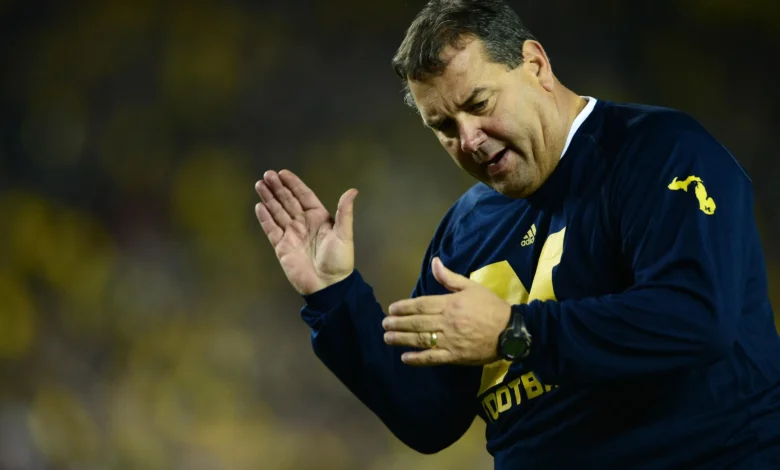Brady Hoke Net Worth: Football Coach’s Financial Journey

Brady Hoke’s financial journey as a football coach is a compelling narrative that intertwines career achievements with economic impact. His coaching stints at high-profile programs have not only bolstered his professional reputation but also significantly augmented his net worth through various contracts and endorsements. However, as we explore the intricacies of Hoke’s financial landscape, it becomes evident that his success is not solely measured by salary figures; deeper insights into his investments and future prospects reveal a multifaceted approach to wealth management. What factors have truly shaped his financial trajectory?
Early Coaching Career
Beginning his coaching journey in the late 1980s, Brady Hoke quickly established himself in the collegiate football landscape.
His coaching philosophy, heavily influenced by mentors and experiences in various programs, emphasized discipline, teamwork, and player development.
Early influences from esteemed coaches instilled in Hoke a commitment to fostering a competitive spirit, ultimately shaping his approach to training and strategy in subsequent coaching roles.
Major Coaching Positions
Brady Hoke’s coaching career includes significant tenures at both the collegiate and professional levels, shaping his reputation in the sport.
His positions at various universities, notably as head coach at Michigan, illustrate his impact on college football, while his experience in the NFL adds a layer of complexity to his coaching philosophy.
Analyzing these major coaching roles provides insight into Hoke’s strategies and contributions to the teams he has led.
College Coaching Tenure
Throughout his coaching career, Hoke has held several significant positions that have shaped his professional trajectory and influenced the teams he managed. His coaching philosophy has consistently emphasized player development, focusing on fostering talent and discipline. Below is a summary of Hoke’s major college coaching roles:
| Year | Team | Position |
|---|---|---|
| 2003-2008 | Ball State University | Head Coach |
| 2009-2010 | San Diego State University | Head Coach |
| 2011-2014 | University of Michigan | Head Coach |
| 2019-Present | San Diego State University | Head Coach |
NFL Coaching Experience
Hoke’s NFL coaching experience, while not as extensive as his college tenure, includes significant roles that contributed to his development as a coach.
His positions with the San Diego Chargers and other teams shaped his coaching philosophy, emphasizing adaptability and resilience.
Hoke’s leadership style, characterized by strong communication and team-building skills, reflects his commitment to fostering player growth and maximizing performance in high-pressure situations.
Coaching Contracts Overview
Coaching contracts in collegiate athletics are often complex and multifaceted, reflecting both the value of the coach’s expertise and the financial commitments of the institutions involved.
These contracts typically outline coaching salaries, performance incentives, and termination clauses.
Additionally, contract negotiations can significantly impact a coach’s overall compensation and job security, highlighting the delicate balance between institutional budgets and the competitive nature of college sports.
Endorsements and Sponsorships
Endorsements and sponsorships play a significant role in the financial landscape for coaches like Brady Hoke, supplementing their salaries and enhancing their overall net worth.
Key factors influencing endorsement revenue include:
- Strategic sponsorship deals that align with personal values.
- Visibility and success on the field to attract reputable brands.
- Community engagement that fosters loyalty and support.
These elements collectively elevate a coach’s financial standing.
Financial Impact of Success
How does a coach’s success translate into financial gains?
Success metrics such as win-loss records and bowl game appearances often lead to significant financial milestones. Increased ticket sales, enhanced merchandise revenue, and lucrative television contracts typically follow successful seasons.
Furthermore, a coach’s reputation can attract higher-paying job offers, creating a cascading effect on their overall financial health and stability within the competitive sports industry.
Investments and Business Ventures
Brady Hoke’s financial portfolio extends beyond his coaching career, encompassing various investments and business ventures.
Notably, his initiatives in coaching camps demonstrate a strategic approach to generating income while fostering talent development.
Additionally, his holdings in real estate reflect a diversification strategy that could enhance his overall net worth and provide long-term financial stability.
Coaching Camps Initiatives
Leveraging his extensive experience in college football, Hoke has initiated several coaching camps aimed at developing young talent and enhancing the skills of aspiring athletes.
These initiatives focus on:
- Conducting coaching clinics for skill development.
- Providing youth programs that promote teamwork and discipline.
- Offering mentorship opportunities to encourage personal growth.
Through these efforts, Hoke fosters a culture of excellence and empowerment among the next generation of players.
Real Estate Holdings
Real estate investments represent a significant aspect of Hoke’s financial portfolio, showcasing his strategic approach to wealth accumulation beyond coaching.
By engaging in property management, he diversifies his income streams and mitigates financial risks.
This calculated investment strategy not only enhances his net worth but also demonstrates a commitment to long-term financial stability, reflecting an understanding of market dynamics and asset growth.
Comparison With Peers
When examining the net worth of Brady Hoke in relation to his peers in college football coaching, it becomes evident that various factors contribute to the disparities observed among them.
Key considerations include:
- Coaching salaries that vary significantly across programs.
- Career longevity impacting accumulated wealth.
- Marketability and success leading to lucrative contracts.
These elements highlight the complex financial landscape of college football coaching.
Personal Life and Expenses
The financial landscape of college football coaching extends beyond salaries and contracts to encompass personal life and expenses, which can significantly impact an individual’s net worth.
Brady Hoke’s personal expenses, influenced by family dynamics, include housing, education, and lifestyle choices.
These factors contribute to his overall financial picture, revealing how personal and professional realms intertwine within the realm of sports coaching.
Future Financial Prospects
Although various factors influence the financial trajectory of a college football coach, Brady Hoke’s future financial prospects appear promising given his extensive experience and recent successes.
Key elements supporting this outlook include:
- Strategic future investments to enhance wealth.
- Comprehensive financial planning to navigate market fluctuations.
- Potential opportunities for lucrative coaching positions.
These aspects collectively position Hoke for continued financial growth and stability.
Conclusion
In the realm of football coaching, where victories are often measured in championships and accolades, Brady Hoke’s financial journey reveals an ironic juxtaposition. Despite the fleeting nature of success in sports, Hoke’s career reflects the paradox of stability derived from transience. The lucrative contracts and sponsorships amassed through wins serve as a testament to a coach’s ability to navigate an unpredictable landscape. Ultimately, the financial legacy crafted by Hoke underscores the irony that in sports, permanence often springs from impermanence.



